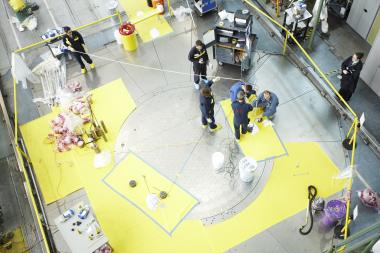Welding repairs to the NRU reactor at Chalk River are taking longer than expected and the unit is now slated to return in April.
 |
| Remote inspections from the top of NRU in June last year (Image: AECL) |
Between them the two elderly reactors produce the vast majority of the world's molybdenum-99, which decays in a matter of hours into technetium-99m for use in medical imaging procedures.
The Chalk River laboratories are owned and operated by the crown corporation Atomic Energy of Canada Ltd (AECL), and it is AECL that is undertaking the repairs. The company said it had experienced difficulties in deploying a specialised tool that must perform a sequence of welds inside NRU's reactor vessel, which had begun to leak after 53 years of use.
To help offset schedule delays, return-to-service activities are being brought forward, said AECL, giving the example of the commissioning of the fuel rod flask, a major component required for refuelling.
Inspecting and repairing damage to the reactor vessel required AECL to go through the lengthy process of removing all the nuclear fuel from NRU, and regulatory permission will be required to put this back ahead of restart.
The Canadian Nuclear Safety Commission last week described an updated permissions process, which begins with AECL inputting fuel up to an agreed temporary subcritical condition. It can the apply for permission to restart at a hearing, but at that time the NRU vessel has to be filled with heavy water and demonstrated to be water-tight. Approval at the hearing would allow AECL to complete fuelling and recommence operation.
Currently welding repairs are about 30% complete and the hearing on permission to restart is tentatively slated for mid-to-late February.
Researched and written
by World Nuclear News





_63865.jpg)
_18570.jpg)
_16159.jpg)





